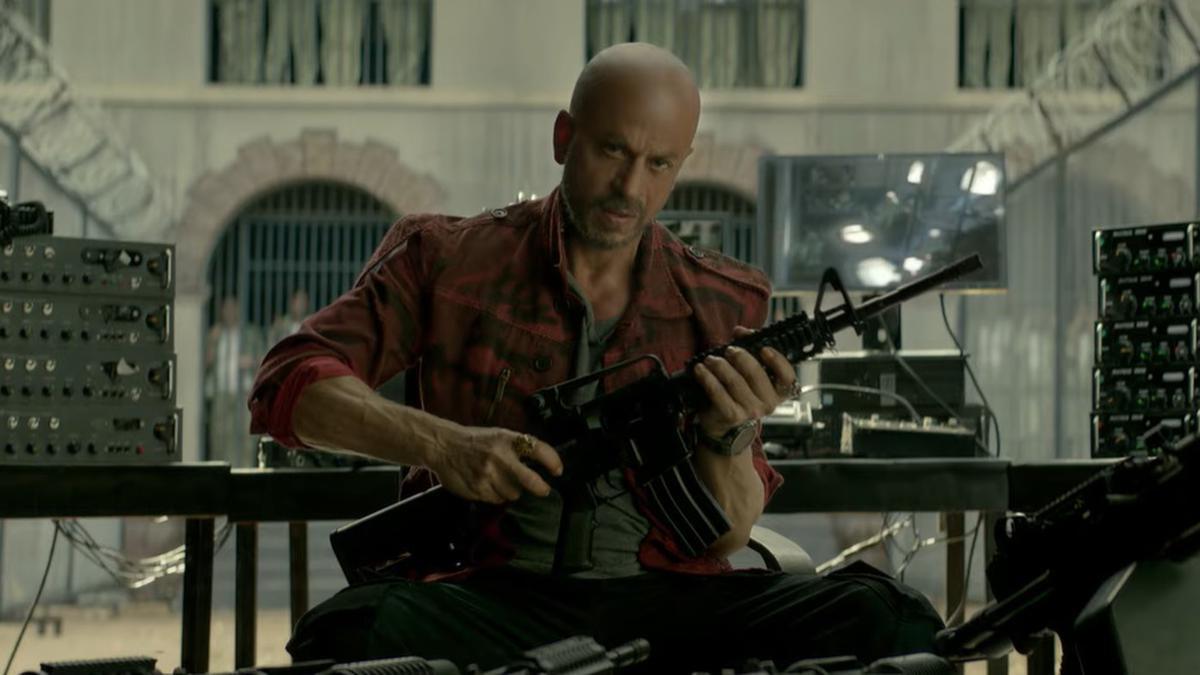
‘Jawan’ movie review: Shah Rukh Khan is spectacular in Atlee’s socially-charged thriller
The Hindu
Shah Rukh Khan launches his own ‘Clean India Campaign’ in this elaborate but persuasive action film from director Atlee
It’s an opening sequence for the ages. Somewhere along the northern borders of India, a battered soldier recovers. The kindly and idyllic village he’s resuscitating in is set upon; people are shot, stabbed, drowned in a creek. The soldier rises like a messiah, swooping down with a spear against a thundering sky. We don’t see his face yet, wrapped in gauze, though his eyes fill us in. The staging is spectacular, mythic and rimmed with darkness. There’s also a flaming horse darting across the screen. No wonder Japanese video-game designer Hideo Kojima couldn’t contain his excitement on social media. As weird as it may sound, Jawan is, after all, the most Metal Gear-ish Shah Rukh Khan film.
Tamil director Atlee has been teasing a film with Khan since 2019. It’s not the first time an accomplished southern director has joined forces with a major Bollywood star for an action film with charged sociopolitical themes (Atlee’s mentor, Shankar, likely showed the way). Yet, there might be more to this collaboration than meets the eye. Atlee’s characters tend to have doubles and aliases . The multiple identities can be stashed in a single body (Vijay in Theri) or several (Vijay in Mersaland Bigil). The last two films, notably, were massy, twisty stories centered on fathers and sons. All of which screams out for Khan, who — rivalled only by Amitabh Bachchan and Akshay Kumar — is Hindi cinema’s biggest magnet for multiple-role films.
30 years after that explosive opening, we meet Khan — now playing a goofy, wisecracking vigilante with a shaved head —as he hijacks a metro train in Mumbai. He’s assisted by a squad of female fighters, most of whom get names and a few elite ones backstories. Also on the train is Alia, the daughter of a dead-eyed arms dealer named Kaalie (Vijay Sethupathi in a mean beard). It’s revealed soon enough — spoilers ahead — that Khan in the present timeline is actually Azad Rathod, the jailer of a high-security female prison who moonlights as an ethical terrorist. What’s more, Azad is set to marry Narmada (Nayanthara), the fearless negotiator he was making song requests to while leading the hijack.
I won’t divulge how many Shah Rukh Khans you get in Jawan, but it’s enough for the price of a single ticket. Khan, 57, is an entertainer at heart but it is the flashes of menace and malevolence that mark out his best performances down the years. Since he can’t commit to outright villainy anymore — the cost of being a successful megastar — he turns to his quasi-antihero avatar with particular relish. “When I become a villain, the heroes don’t stand a chance,” he grins, more in self-regard than as an actual threat. Jawan isn’t a morally challenging or ambiguous film like Fan or Baazigar, but it still stretches the limits of its superstar’s repertoire. Benign, upstanding, ideal citizen Khan — check. Grizzled, cigar-chomping, Wolverine-recalling Khan — also check.
The action in Jawan is as slickly persuasive as you’d expect from a big-budget Atlee film. Drones, choppers, gatling guns; the director raids the whole inventory of Hollywood-style action blockbusters. However, what really sells these set pieces, besides some fluid jumps and kicks from Khan, are the smudges of Indianness applied to the grand canvas. I loved the idea of one of the hijackers leaving the crime scene in an auto. Or the flashback of Deepika Padukone (in a key cameo) slamming Khan in the mud. As in his past films, Atlee roots his action in urgent social justice anger. Khan launches his own Clean India campaign, taking on one corrupt institution after another, from agriculture to healthcare and (more subtly and respectfully) defence. At least three different characters are labeled ‘deshdrohi’ (traitor) as the film insistently points up the insidiousness of such claims.
Jawan is also a movie in love with other movies. Bollywood and Hollywood fans alike will have a field day playing spot-the-reference. Before his endgame is revealed, Khan’s vigilante has shades of The Joker, Darkman, even a bit of Dennis Hopper from Speed. Kaali literally hands out red and blue pills (a neat idea, I think, since he’s working to corrupt the system). We get a Russian mob boss in a Bane mask. Yet, as in Pathaan, the best references are to Khan’s own filmography. Azad’s adoptive mother (Riddhi Dogra) is named Kaveri Amma, which was also the name of Khan’s adoptive mother in Swades (2004). There are similar nods to Main Hoon Na, Rab Ne Bana Di Jodi and, perhaps most fittingly, Duplicate.
Not everything flies. There is a surge of Atlee-esque melodrama in the second half. Despite Anirudh Ravichander’s best efforts, the songs feel generic (‘Chaleya’ by Arijit Singh is especially forgettable; there is a better Arabic version on YouTube). However, Vijay Sethupathi truly unleashes his wildness in the later scenes and is a hoot. Nayanthara coolly underplays her typical heroine role, less smitten with Khan than the film would like her to be. The audience, though, is wholly smitten.

National Press Day (November 16) was last week, and, as an entertainment journalist, I decided to base this column on a topic that is as personal as it is relevant — films on journalism and journalists. Journalism’s evolution has been depicted throughout the last 100-odd years thanks to pop culture, and the life and work of journalists have made for a wealth of memorable cinema.










